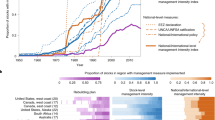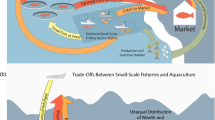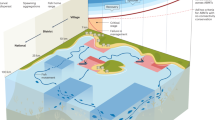Abstract
One billion people depend on seafood as their primary source of protein and 25% of the world’s total animal protein comes from fisheries1. Yet a third of fish stocks worldwide are overexploited or depleted1,2. Using individual case studies, many have argued that community-based co-management3 should prevent the tragedy of the commons4 because cooperative management by fishers, managers and scientists often results in sustainable fisheries3,5,6. However, general and multidisciplinary evaluations of co-management regimes and the conditions for social, economic and ecological success within such regimes are lacking. Here we examine 130 co-managed fisheries in a wide range of countries with different degrees of development, ecosystems, fishing sectors and type of resources. We identified strong leadership as the most important attribute contributing to success, followed by individual or community quotas, social cohesion and protected areas. Less important conditions included enforcement mechanisms, long-term management policies and life history of the resources. Fisheries were most successful when at least eight co-management attributes were present, showing a strong positive relationship between the number of these attributes and success, owing to redundancy in management regulations. Our results demonstrate the critical importance of prominent community leaders and robust social capital7, combined with clear incentives through catch shares and conservation benefits derived from protected areas, for successfully managing aquatic resources and securing the livelihoods of communities depending on them. Our study offers hope that co-management, the only realistic solution for the majority of the world’s fisheries, can solve many of the problems facing global fisheries.
This is a preview of subscription content, access via your institution
Access options
Subscribe to this journal
Receive 51 print issues and online access
$199.00 per year
only $3.90 per issue
Buy this article
- Purchase on SpringerLink
- Instant access to full article PDF
Prices may be subject to local taxes which are calculated during checkout



Similar content being viewed by others
References
Food and Agriculture Organization of the United Nations. FAO Yearbook: Fishery and Aquaculture Statistics 2007 (FAO, 2009)
Worm, B. et al. Rebuilding global fisheries. Science 325, 578–585 (2009)
Ostrom, E. Governing the Commons: The Evolution of Institutions for Collective Action (Cambridge Univ. Press, 1990)
Hardin, G. The tragedy of the commons. Science 162, 1243–1248 (1968)
Costanza, R. et al. Principles for sustainable governance of the oceans. Science 281, 198–199 (1998)
Dietz, T., Ostrom, E. & Stern, P. The struggle to govern the commons. Science 302, 1907–1912 (2003)
Pretty, J. Social capital and the collective management of resources. Science 302, 1912–1914 (2003)
Beddington, J. R., Agnew, D. J. & Clark, C. W. Current problems in the management of marine fisheries. Science 316, 1713–1716 (2007)
Berkes, F. Community-based conservation in a globalized world. Proc. Natl Acad. Sci. USA 104, 15188–15193 (2007)
Pomeroy, R. S. & Williams, M. J. Fisheries Co-Management and Small-Scale Fisheries: A Policy Brief (ICLARM, 1994)
Borrini-Feyerabend, G., Pimbert, M., Farvar, M. T., Kothari, A. & Renard, Y. Sharing Power: Learning by Doing in Co-Management of Natural Resources Throughout the World (IIED and IUCN/CEESP/CMWG, 2004)
Defeo, O. & Castilla, J. C. More than one bag for the world fishery crisis and keys for co-management successes in selected artisanal Latin American shellfisheries. Rev. Fish Biol. Fish. 15, 265–283 (2005)
Wilson, J., Yan, L. & Wilson, C. The precursors of governance in the Maine lobster fishery. Proc. Natl Acad. Sci. USA 104, 15212–15217 (2007)
Basurto, X. & Ostrom, E. The core challenges of moving beyond Garrett Hardin. J. Nat. Resour. Pol. Res. 1, 255–259 (2009)
United Nations Development Programme. The Human Development Index (UNDP, 2009)
Ostrom, E. A general framework for analyzing sustainability of social-ecological systems. Science 325, 419–422 (2009)
Hilborn, R. Defining success in fisheries and conflicts in objectives. Mar. Policy 31, 153–158 (2007)
Chetty, R. K. et al. A systematic approach to preclinical and clinical safety biomarker qualification incorporating Bradford Hill’s principles of causality association. Clin. Pharmacol. Ther. 88, 260–262 (2010)
Castilla, J. C. & Defeo, O. Paradigm shifts needed for world fisheries. Science 309, 1324–1325 (2005)
Stefansson, G. & Rosenberg, A. A. Combining control measures for more effective management of fisheries under uncertainty: quotas, effort limitation and protected areas. Phil. Trans. R. Soc. B 360, 133–146 (2005)
Breiman, L. Random forests. Mach. Learn. 45, 5–32 (2001)
Hilborn, R. Managing fisheries is managing people: what has been learned? Fish Fish. 8, 285–296 (2007)
Olsson, P., Folke, C. & Hahn, T. Social-ecological transformation for ecosystem management: the development of adaptive co-management of a wetland landscape in southern Sweden. Ecol. Soc. 9, 2 (2004)
Sigmund, K., De Silva, H., Traulsen, A. & Hauert, C. Social learning promotes institutions for governing the commons. Nature 466, 861–863 (2010)
Olsson, P., Folke, C. & Berkes, F. Adaptive co-management for building resilience in social–ecological systems. Environ. Manage. 34, 75–90 (2004)
Costello, C., Gaines, S. D. & Lynham, J. Can catch shares prevent fisheries collapse? Science 321, 1678–1681 (2008)
Essington, T. E. Ecological indicators display reduced variation in North American catch share fisheries. Proc. Natl Acad. Sci. USA 107, 754–759 (2010)
Branch, T. A. How do individual transferable quotas affect marine ecosystems? Fish Fish. 10, 39–57 (2009)
Pollnac, R. et al. Marine reserves as linked social–ecological systems. Proc. Natl Acad. Sci. USA (2010)
Levin, S. Crossing scales, crossing disciplines: collective motion and collective action in the Global Commons. Phil. Trans. R. Soc. B 365, 13–18 (2010)
Acknowledgements
N.L.G. was partially funded by the National Science Foundation (award 0308440) and a Fulbright–OAS Initiative in Ecology fellowship. O.D. acknowledges support by the Pew Charitable Trusts. We thank E. Ostrom, T. A. Branch, and X. Basurto for comments on the manuscript and A. E. Punt, W. N. Venables, R. Perera and S. Sethi for discussions on the methodological and statistical approach.
Author information
Authors and Affiliations
Contributions
N.L.G. designed the study, compiled and analysed the data and performed the statistical analyses; O.D. compiled and analysed the data. All authors discussed the results and jointly wrote the manuscript.
Corresponding author
Ethics declarations
Competing interests
The authors declare no competing financial interests.
Supplementary information
Supplementary Information
The file contains Supplementary Methods, Supplementary Results, Supplementary References, Supplementary Tables 1-6 and Supplementary Figures 1-7 with legends. (PDF 1247 kb)
Rights and permissions
About this article
Cite this article
Gutiérrez, N., Hilborn, R. & Defeo, O. Leadership, social capital and incentives promote successful fisheries. Nature 470, 386–389 (2011). https://doi.org/10.1038/nature09689
Received:
Accepted:
Published:
Issue date:
DOI: https://doi.org/10.1038/nature09689
This article is cited by
-
Women’s experiences of participatory small-scale fisheries monitoring in Timor-Leste
Maritime Studies (2024)
-
Nutrient supply from marine small-scale fisheries
Scientific Reports (2023)
-
Humanity’s diverse predatory niche and its ecological consequences
Communications Biology (2023)
-
Understanding the social–ecological systems of non-state seafood sustainability scheme in the blue economy
Environment, Development and Sustainability (2023)
-
Strategies for Increasing Participation of Diverse Consumers in a Community Seafood Program
Journal of Agricultural and Environmental Ethics (2023)




Jason Krumholz
I have to say that I'm a bit disappointed with this manuscript, and with the editorial process here. The research contained in this article is timely, interesting, well executed, exceptionally visualized, and in all respects worthy of publication, however the conclusion which will be 'excerpted' from this manuscript for 'sound bytes' is "co-management is the only realistic solution for the majority of the world's fisheries".
This research does not support that conclusion in any way. To show that co-management is necessary, one must show that co-managed fisheries succeed, while fisheries which are not co-managed fail. This manuscript makes no attempt (nor does it claim) to demonstrate this point. In fact, the authors point out that co-management is only effective in the presence of certain key factors (e.g. strong leadership and well established quotas). One would argue (quite persuasively) that it's likely to be the leadership and quotas that are causing the fisheries to be well managed, not necessarily the co-management. If a omnipotent dictator established and thoroughly enforced effective quotas, the fishery would meed all of the biological qualifications of being 'well managed'...
The above example is extreme, and I certainly acknowledge that co-management is one effective route to achieve these things which are necessary for effective management, but that's not what the authors suggest (nor can even that conclusion be supported by these data) This disjunction is particularly disappointing given the quality and validity of this research, which stands on its own without the questionable assertion. There is no reason for the authors to present scientifically unjustified categorical statements like this, and it is the responsibility of the editorial staff (if not the authors) to keep them in check.
And yet somehow, I feel like th is manuscript may not have made it into Nature without those statements, and no doubt the authors felt similarly, otherwise I doubt they would have made them...
Nicolas Gutierrez
Thank you for your interest in our work and your comment. However, I think you misunderstood the concept behind our assertion in the last sentence of the summary and the overall message of our study.
First, community-based co-management is the only realistic solution for the majority of fisheries worldwide, particularly yet not exclusively, those artisanal and in developing countries. In these fisheries, management, monitor, control, and enforcement of regulations under top-down centralized governments is extremely difficult, if not impossible, due to limited economic and human resources. Users' involvement in all aspects of resources management is then the only sensible solution to sustain aquatic resources. This is not a conclusion of our study, but a well known fact in natural resources management shown elsewhere in the primary literature during the last 20 years.
Second, our analysis of 130 fisheries in countries with different degrees of human development, different ecosystems, fishing sectors and type of resources, shows more than 40% of the study cases with 6, 7 and all 8 positive social, ecological and economic performance indicators resulting from the co-management system. Indeed, community-based co-management can solve many problems facing global fisheries.
Lastly, we clearly acknowledge in the manuscript and in the supplementary information the impossibility of having control fisheries to compare top-down vs. co-managed systems, as follows: 'Furthermore, although comparison to top-down management would be of interest, the objective of this study was to identify and quantify the co-management attributes determining successful fisheries, and not explicitly to compare its performance with top-down centralized management'
Jason Krumholz
Thanks for your response to my post. As I mentioned in my earlier post, I agree with several of your assertions, namely 'community based co-management can solve many problems facing global fisheries'. However, there is a clear difference between this statement, and the statement which you make in your manuscript, which was 'co-management is the only realistic solution for the majority of the world's fisheries'. I also pointed out in my earlier comment (as you mention above) that your study acknowledges the impossibility (or at least the great difficulty) of comparing to top down control. However, the absence of such scientific controls and certainties is all the more reason to avoid using blanket statements like the one in question in the abstract of high profile scientific literature.
If this statement is, as you assert in your reply 'a well known fact in natural resources management' then there ought (at least) to be citations to the primary literature attached to that statement, which there are not.
Three points remain:
1) This is a great paper, and represents a lot of hard work, and a significant contribution to the field.
2) That statement is not (as you point out) supported by your research, and can easily be taken out of context by popular media and be interpreted as a prominent conclusion of your study. In fact, if you look at how this manuscript is being covered (and it has received a great deal of press attention, rightfully so), you will find numerous cases of how that statement is being interpreted incorrectly as a conclusion of the study.
3) It does not take a great deal of foresight to realize that this statement can easily be misinterpreted. This is a very similar situation to the misinterpretation by popular media associated with the highly publicized Worm et al. 2006 paper on ocean diversity loss in Science to which the authors are no doubt familiar.
Therefore, as part of the editorial process, it should at least have been modified to something like what you suggest above ('co-management can solve many problems facing global fisheries').